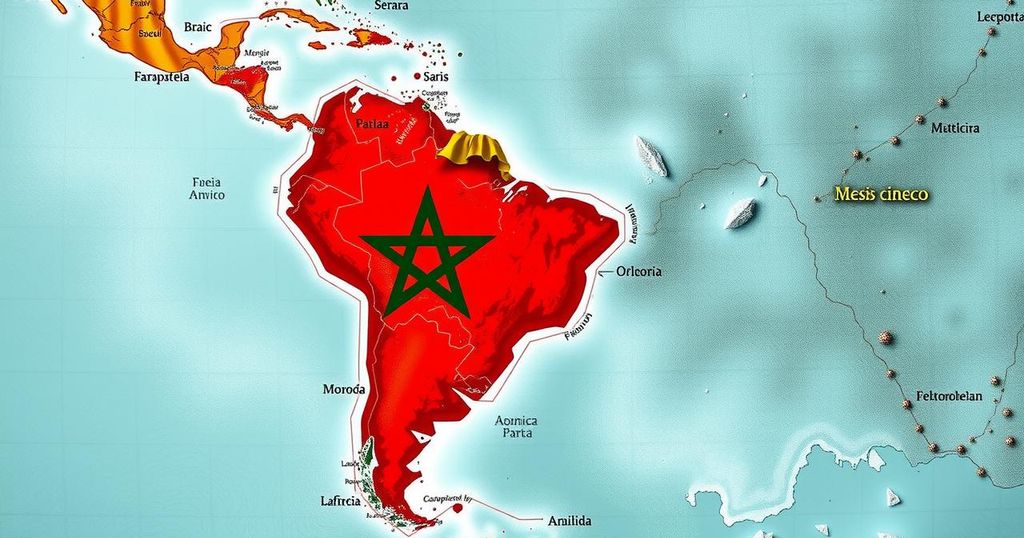Latin America Shifts Support Toward Morocco: A New Era for Sahara Diplomacy

In 2024, Latin America witnessed a shift towards supporting Morocco’s position on the Sahara issue. Countries including Ecuador, Panama, Brazil, and Chile have distanced themselves from separatist claims and recognized Morocco’s territorial integrity. King Mohammed VI’s initiatives have played a crucial role, leading to the endorsement of autonomy as a realistic solution and gaining broader support across the region, even in public opinion.
In 2024, a significant shift occurred in the stance of Latin American nations regarding the Moroccan Sahara issue. Under the guidance of King Mohammed VI, Morocco’s diplomatic initiatives have increasingly garnered support and undermined separatist claims within the region. The King’s remarks during the anniversary of the Green March underscored the importance of collective efforts to uphold Morocco’s territorial integrity, a sentiment echoed by several Latin American governments.
Countries such as Ecuador, Panama, Peru, Brazil, Paraguay, and recently Chile have progressively aligned themselves with Morocco’s calls for autonomy in the Sahara as a viable and enduring resolution to an ongoing conflict. Ecuador led the way by ceasing its recognition of the so-called “phantom republic,” a decision followed by Panama cutting ties with the separatist entity the following month. This diplomatic evolution highlights an increasing recognition of the illegitimacy of the ‘Polisario’ as perceived under international law.
Miguel Angel Rodriguez Mackay, the former Foreign Minister of Peru, declared that the withdrawal of recognition from this entity has become “inevitable.” Additionally, Paraguay’s parliament supported Morocco’s sovereignty through a resolution, urging the government to adopt a similar stance. The Brazilian Senate echoed this sentiment and commended Morocco’s earnest endeavors to resolve the dispute during official visits. Notably, Chilean officials also announced alignment with the Moroccan initiative, advocating for a just political solution.
Beyond diplomacy, Morocco has been cultivating strong relations with Latin American countries through the establishment of an economic forum aimed at enhancing collaboration. This engagement has also garnered backing from regional parliamentary bodies like Mercosur and the Central American Parliament. Furthermore, Morocco’s endeavors in higher education and media have successfully swayed public opinion in favor of its stance, diluting previous support for the Polisario, historically championed by Algeria.
This development signifies a rising acknowledgement among Latin American elites of the legitimacy and practicality of Morocco’s autonomy proposal. Through strategic diplomacy, Morocco continues to secure its position on the global stage, pushing separatist ideologies towards obsolescence amid rapidly evolving international sentiments.
The article discusses a noteworthy transformation in the diplomatic relations between Latin American nations and Morocco regarding the Sahara dispute. Historically, many Latin American countries had shown support for the separatist Polisario Front, largely influenced by Algeria. However, recent diplomatic efforts by Morocco, particularly under King Mohammed VI, have shifted this trend. By fostering closer ties and presenting the autonomy initiative as a reasonable solution, Morocco has successfully diminished support for separatism in the region, coinciding with changing perceptions at the governmental and public levels in Latin American countries.
Latin America’s evolving stance on the Moroccan Sahara issue demonstrates a significant diplomatic transformation. The withdrawal of recognition for the Polisario Front by multiple countries, strengthened by King Mohammed VI’s effective leadership, highlights the region’s growing acknowledgment of Morocco’s territorial claims. As diplomatic relations flourish and public opinion shifts, it is likely that Morocco will continue to consolidate its position, moving towards a consensus on its autonomy initiative and diminishing the influence of separatist ideologies.
Original Source: fesnews.media






